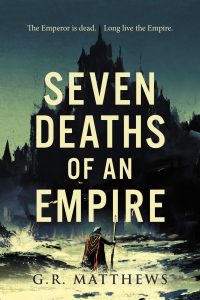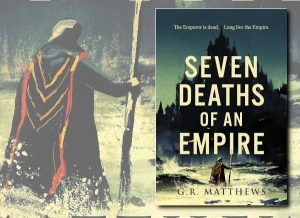SEVEN DEATHS OF AN EMPIRE by G.R.Matthews
 The Roman aesthetic is strong in Seven Deaths of an Empire, G.R. Matthews’ debut with Rebellion Publishing. From the Roman numerals in the chapter headings to the pila and gladius that the protagonists wield as they lock shields in battle formations, there is much to make a Pliny or Cicero feel at home. The story is told in two threads that slowly draw together, the General – Bordan – too old for campaigning left embroiled in politics in the capital, and the apprentice magician Kyron marching with the Emperor and his army far to the North through untamed forests of rebellious tribes. That setting too, has its Roman echoes, the Teutoburg forest and the fate of Varus’s three legions. In his title Matthews has gone for the kind of literal approach piloted by Four Weddings and a Funeral, for the plot navigates from one significant death to another as it charts the fate of the Empire.
The Roman aesthetic is strong in Seven Deaths of an Empire, G.R. Matthews’ debut with Rebellion Publishing. From the Roman numerals in the chapter headings to the pila and gladius that the protagonists wield as they lock shields in battle formations, there is much to make a Pliny or Cicero feel at home. The story is told in two threads that slowly draw together, the General – Bordan – too old for campaigning left embroiled in politics in the capital, and the apprentice magician Kyron marching with the Emperor and his army far to the North through untamed forests of rebellious tribes. That setting too, has its Roman echoes, the Teutoburg forest and the fate of Varus’s three legions. In his title Matthews has gone for the kind of literal approach piloted by Four Weddings and a Funeral, for the plot navigates from one significant death to another as it charts the fate of the Empire.
While G.R.R. Martin took inspiration from the English Wars of the Roses and Hadrian’s Wall rather than the Roman Empire and the River Rhine, there are parallels in how G.R. Matthews has wrought history into his fantasy setting. The emperor’s sudden unexpected death just before the book’s opening precipitates a succession crisis, for the mystic process of coronation requires his body and his amulet be brought to his heir for coronation. As the bulk of the army must press on with the invasion and subjugation of the Northern forest tribes, Kyron, his master, some meddlesome priests and a small honour guard of soldiers are assigned to escort the emperor’s body back to the capital. Meanwhile Bordan must navigate the competing suspicions of overweaning dukes, grieving royal family, haughty priests and barely tolerated magic-users. The story’s structure then alternates between Kyron and Bordan’s points of view. Matthews eschews the familiar fantasy device of a prologue to set the scene, but does however use brief fragments of back story at the opening of each chapter which, as they accumulate, explain how the characters came to their current positions.
Matthews’ magic system is more explicit and systematic than the vague mysticism of Melisandre in Game of Thrones, or the creepy undeadness of the white walkers. Kyron and his master weave motes of magic into constructs that can act as shields or weapons. It is a skill that only a few are born to and not all of them get the chance to be trained. The church of the flame and its priests are so suspicious of magic that “wild” magicians who are not brought under the protection of the magistry and its education programme are likely to be killed by the church as dangerous aberrations. Between church and magistry the army paradoxically stands as peacemaker, the third of the three pillars of imperial government and leadership.
Kyron’s journey proves to be somewhat eventful, the escort too large to pass unnoticed through hostile territory, but not large enough to dissuade wannabe tribal heroes from trying to forge a name for themselves with a blow at the hated empire’s dignity. Bordan, also, is not above getting his hands bloody as the Emperor’s young heir blunders with Joffrey like arrogance into his premature inheritance.
Both protagonists find conflict aplenty athwart their paths. Matthews delivers visceral descriptions of battle, the cut and thrust of gladius and pila, the shouldering of shields, the smell of blood and fear – and weaving through this, the delicate nets of magical constructs that can still snap, inflame or explode.
However, Matthews also fleshes out the politics, economics and history of the Empire in enough detail to make the world feel complete with its characters motivated by more than a simple lust for power. Imperial ruling families do not get to be imperial ruling families without a certain ruthless streak as the widowed empress observes to Bordan.
“My son will sit on the throne, General,” the Empress said and took a gulp of her drink, her lips curling at the taste. “We will see it happens, and if a Duke or two must die along the way, so be it.”
While Bordan steers a delicate path between the ambition of dukes and the inexperience of heirs, Kyron finds a companion in Emlyn the young tribeswoman who has agreed to guide the honour guard and their charge back south through the forest. A certain kinship is forced upon them by the suspicion with which the rest of the guard – and particularly the priests – view them both, the heretical magician and the pagan tribeswoman. Matthews uses this to draw out the differences of culture between tribe and empire, emphasising along the way that the tribes are not the homogenous whole that imperial prejudice would label them.
“They were not my tribe,” she pointed out.
“Your tribe, their tribe, still a tribe.”
“You possess a strange world view, Kyron. Is that common to everyone in the Empire?”
“Is what common?” he snapped back, standing up.
“To view the world in such absolutes. Them and us, Empire and not Empire. How far do you take that, I wonder?”
With so many in a contemporary world fond of such simple labels, it is always pleasing to find speculative fiction reminding us that people are thankfully more subtle and nuanced than that. In another striking echo of modern intrigue, one death turns out to have been delivered via a poison secreted in the victim’s stockings. The timescale of traditional publishing suggests that Matthews had anticipated, rather than been inspired by the tale of Novichok placed on the underwear of the Russian opposition leader, Alexei Navalny – but the parallel is remarkable. As Seven Deaths of an Empire progresses Kyron turns out to have more in common with Emlyn than he realised, though the sense is always that Emlyn has the upper hand in their exchanges.
“I’m hardly younger than you,” he snapped back.
“It takes more than years to make someone older,” Emlyn replied.
Circumstances eventually bring Bordan, Kyron and their respective story threads together, but the bodies keep on tumbling. I must admit I had rather lost count – and I did wonder if I should have counted the Emperor at the start, which sort of left me approaching the novels denouement like an extra in a Dirty Harry film. I could almost imagine Matthews saying
“I know what you’re thinking, reader. You’re thinking “Did he write seven deaths or only six?” Now, to tell you the truth, I’ve forgotten myself in all this excitement. But being this is a fantasy epic, the most powerful genre in the world you’ve gotta ask yourself a question: ‘Do I feel lucky? Well, do ya, reader?”
Certainly the ending has surprises for both Bordan and Kyron. Nobody gets to feel entirely safe as those nearest to them turn out to have more complex agendas than either they or the reader had anticipated and events accelerate towards an explosive but satisfying finale.
Seven Deaths of an Empire is due for release in June 2021.
It’s currently available to pre-order from Rebellion Publishing.

